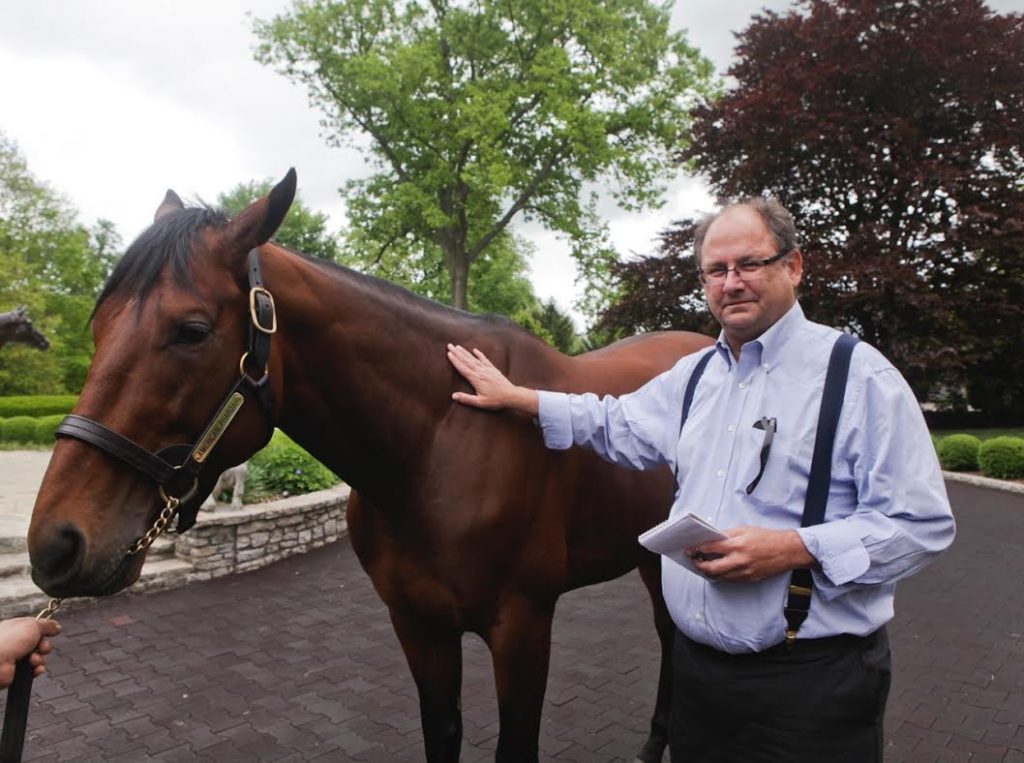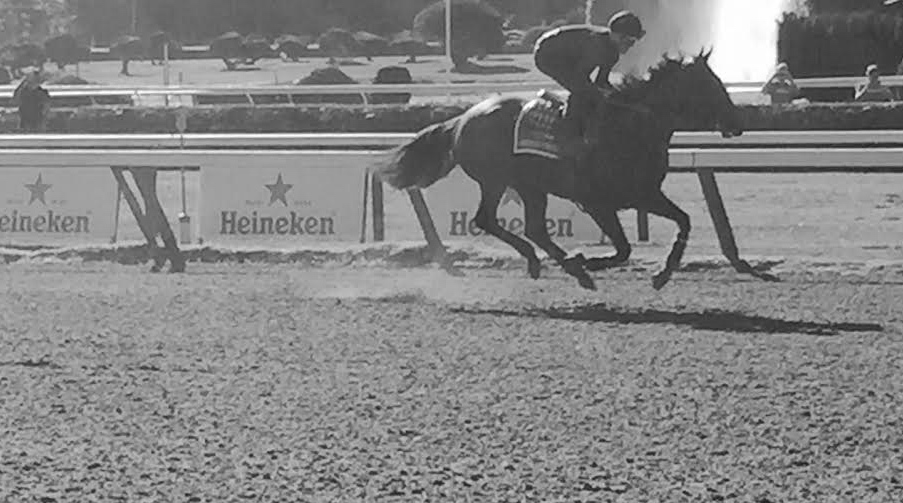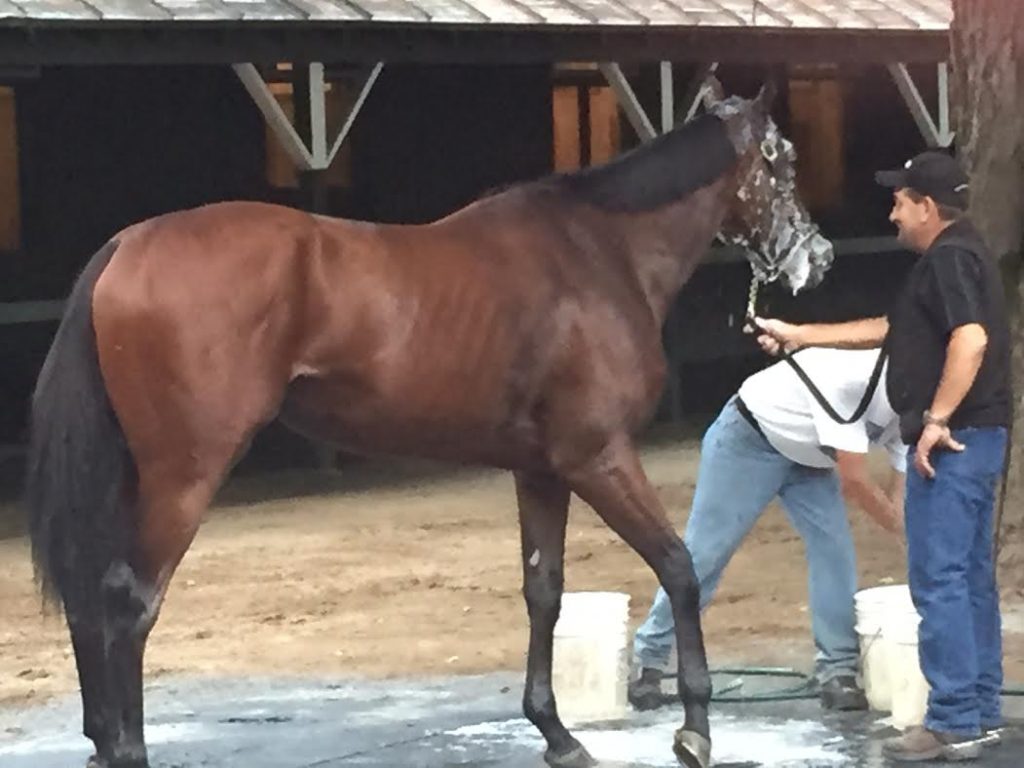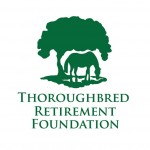
New York Times award-winning journalist Joe Drape shares a moment with Triple Crown winner American Pharoah.
As soon as American Pharoah turned for home in the Belmont Stakes last year, it was clear to everybody in the press box that “nobody was getting him.”
“It was electric,” recalls award-winning New York Times Reporter Joe Drape, who was there for the historic event. “Everyone was restrained at first, saying things like ‘Oh yeah, he’s got it.’ Then the thunder in the grandstand started—it was soul quaking. Then I saw people crying in the press box, and you do choke up a little knowing that you just saw something great, and it doesn’t come often. Not only did American Pharoah win the Triple Crown, but it was a tour de force performance.”
Though the rule is “no cheering” in the press box, even the most seasoned veterans of the news biz couldn’t contain themselves, he adds. After all the disappointments and all the close calls, the little miracle on four legs running before them snapped the losing streak, just like that.
In his new book American Pharoah: The Untold Story of the Triple Crown Winner’s Legendary Rise, two-time Eclipse Award winning writer Drape begins the story of Pharoah at the beginning,

Pharoah working in Saratoga after his victory in New York. Photo by Joe Drape
in the breeding shed, and takes readers on a rollicking ride from colthood to Pharoah’s floating race to the top. Spinning a tale of a colt who raced in his paddock with shocking speed and of those whose careers were touched by the spirited horse, Drape’s work focuses on the horse, but also on the characters whose lives were brought together by the force of a bay American Thoroughbred.
In this week’s Clubhouse Q&A Drape discusses his book and the relevance of American Pharoah’s victory in today’s racing game.
Q: You describe Pharoah’s victory as a ‘shot in the arm’ for racing.
It’s a niche sport. There was a time when it was the only game in town in sports, in part because of the gambling. Racing used to make front-page news in the 1970s New York Times. And I tell people in my office it’s still a good nice sport in the Triple Crown sweep. This is when 30 million people tune in to see hats, animals, and the spectacle. There are only five weeks, but this is where people get introduced to the Triple Crown.
It’s a short burst of time, but it put horse racing front and center in a way it hadn’t been since Affirmed did it. Coverage broke through to the morning shows, and Victor (Espinoza) was even on Dancing with the Stars! So that’s where it gave racing a shot in the arm.
Q: How does this burst of attention help the horses?
It challenges everybody who enjoys the sport to put their best forward in all things.

Pharoah in Saratoga. Photo by Joe Drape
I’ve always argued that the 30 million people who tune in don’t want to see a horse break down. You can’t turn off those 30 million people. And there’s also two million horse players who want there to be a level playing field too, and are also impacted … when there’s evidence of drug use, sore horses, and a commodifying of the breed.
So, I think it’s good when something draws all eyes to you, not only for the positive spin. But, it makes you do right.
Q: Why aren’t more eyes on horse sports?
There’s too many opportunities to attract eyeballs elsewhere. Horse racing still gets better ratings than premier soccer, but it can’t compare with the NFL or major league baseball. Horse racing became popular because you could bet on it.
But, racing is still in good company. Golf and tennis have their major tournaments, and they share a seasonal attraction with racing; this is when they reach the casual sports fans that pay attention to the grand slams in their individual sports. The Triple Crown does the same thing for racing.
Q: How has Thoroughbred advocacy changed the sport?

For a brief span of time last year, American Pharoah put horse racing on the radar of the general public.
It has changed it in the sense that it has made it more humane. You can’t sneak them off to New Holland anymore. Awareness of aftercare has raised the bar of responsibility of owners and trainers. You have a movement now to sign the back of your breeding papers, agreeing to take the horse back. And the Internet has given rise to a network of sleuths and detectives who shine the flashlight into dark corners.
Q: Why did you write the book on Pharoah?
I really wanted to cap my horse racing career by chronicling the Triple Crown. I had sat up there (in the press box) eight times before, and it hadn’t happened. So this was historic.
There was also a very interesting cast of characters surrounding the horse … what attracted me to the sport, the luck, the magic, the intuition that goes into it, is something you can’t bottle. For 18 months things went American Pharoah’s way and there was a tremendous story there.
—Published by Hachette Books, the work is available at http://www.hachettebookgroup.com/search/?q=American+Pharoah, or on Amazon.com.
*Off-Track Thoroughbreds is brought to you by the Thoroughbred Retirement Foundation, the country’s oldest and largest Thoroughbred charity.

